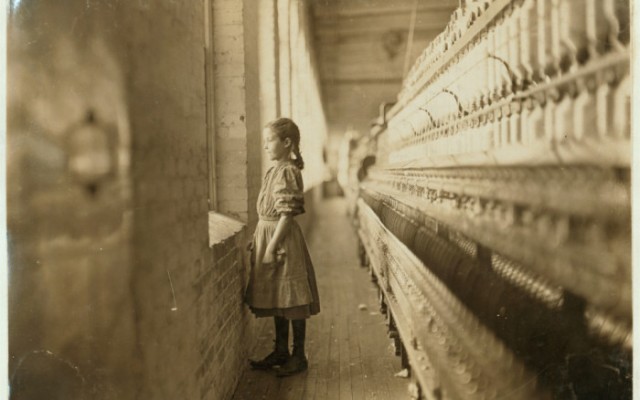
Ida stared longingly out the factory window. Children played in the large empty lot across the street. Her heart ached to join them, but hours still remained on her shift. She glanced over her shoulder, scanning the floor for Mr. Brooks. He didn’t allow Ida and the other kids in the factory breaks from their labors, but Ida’s hands were blistered and sore from working the machinery.
She hoped the new medicine she purchased for Mamma would help her to get better. It frightened Ida to see the blood on the handkerchief every time Mamma went into one of her coughing fits. Perhaps if she were well again, Mamma could take up her sewing to bring in more money. Ida knew she’d never be able to leave the factory, but at least if there was extra income, she might not have to entertain the gentlemen callers that came by in the evening any longer.
Ida’s eyes drooped from fatigue. Before returning to the line, she wondered again how things might be like if Daddy hadn’t died. Spotting Mr. Brooks strolling down the hall, she dutifully returned to her station, fulfilling her role in building the great industrial nation of America.
Word Count: 200
[This is my entry into the Flash Fiction Challenge for Flash Fiction for the Purposeful Practitioner by Roger Shipp. Write a story based on a photo prompt and introductory sentence in 200 words or less.
This photo prompt reminded me of the horrible conditions many children faced during the Industrial Revolution in America and other western countries. It also prompted me to give thought that while the wealthier nations of the world no longer allow children to work in such conditions, many of the developing countries still do. What disturbs me most is that while I would never consciously support companies that employed children or subjected their workers to such poor working conditions, I’m quite certain I have through my purchases as an American consumer.
I normally don’t like to advocate social awareness so directly on my fiction website (I save that for Dumasaphobic Diatribes) but maybe this is appropriate. A bit of research produced some organizations like the International Initiative to End Child Labor and the Child Labor Coalition. Perhaps if you’re interested, you can take a look at these organizations like I have and create better awareness and understanding of the issues. I’ll step off my soapbox now.]
~V

I love that you’ve included those links! This photo definitely evokes plenty of emotion and concern. The part about the drooping eyes reminded me of something I read long ago about kids being punished for falling asleep at their tasks–pretty awful to imagine. Thanks for the thought-provoking post!
LikeLiked by 1 person
Thanks Amy. I think the somber tone of the photo is eliciting a lot of stories like mine. It’s hard for me to imagine that only a century ago this was a reality in our country and is still a reality in other parts of the world. I appreciate your comment. Thanks for stopping by.
LikeLike
The early textile mills in particular fascinate me because of the role of young women. We often forget that industry rides on the backs of real people. It’s definitely a great photo prompt this week!
LikeLiked by 1 person
This is fantastic! So sad — child labor. And it hurts to think that our country was built by it.
LikeLiked by 1 person
Yes, we tend to take a blind eye to the less than appealing parts of history that “Made America Great”. Thanks for your comment. Glad you liked the story.
LikeLiked by 1 person
Wow, very powerful. If only it were only fiction…
LikeLiked by 1 person
If only… 😦
LikeLiked by 1 person
Thank you for adding a discussion of child labour to your story of Ida. It makes me feel like going back and adding one of my historical rants. When I taught, we did several segments on child labour, getting at it through various primary source means.
Thank you, too, for including the links to current events and organizations. The issue of child labour, as you say, continues, and in ways so horrible and evil.
Ida’s condition was so indicative of children in the mills. You have told a true and heart-breaking tale.
Thank you.
LikeLiked by 1 person
You’re welcome and thank you for showing your appreciation. I have another blog where I get “socially active” and rarely bring that to my fiction site, but I felt this was appropriate and worthwhile. I’m as guilty as anyone for my selective memory and divided attention. Sometimes it helps to have a reminder that our work as a race is far from complete.
LikeLike
I wish it was only America where things like this were happening. Child labour was a significant part of the past, but it’s still happening around the world. Horrible to imagine.
LikeLiked by 1 person
hanutingly amazing
LikeLiked by 1 person
Very sad that the America, Britain etc built their factories and industrialization,on the backs of poor women and children, without thought for them. Yout story shows this very well, the conditions they lived in, hours they worked, the health problems that prevailed. It makes me think of a Poem by Blake about the chimney sweeps – little boys of two or three spent hours inside chimney’s sweep ing and dying early from the health conditions. A horrible past. Well written.
LikeLiked by 1 person
Thank you so much, Amanda.
LikeLiked by 1 person
amazing story
LikeLiked by 1 person
Thank you!
LikeLiked by 1 person
I like your soapbox!! Thank you for speaking out. This picture brought these types of horrible situations to our hearts and minds!
LikeLiked by 1 person
Thought-provoking indeed… and poignant too! Thank you for sharing those links V, that is very kind. 🙂
LikeLiked by 1 person
Thank you.
LikeLiked by 1 person
Welcome! 😉
LikeLike